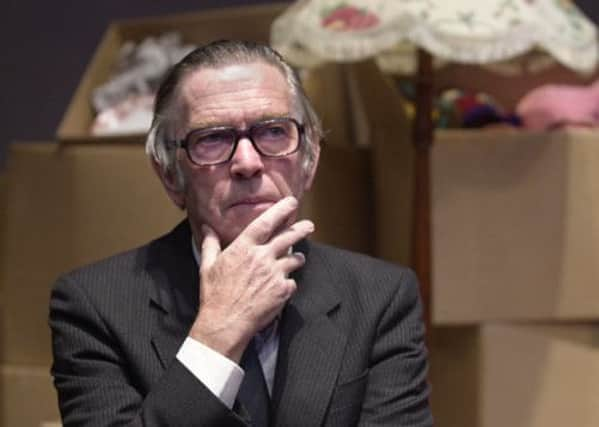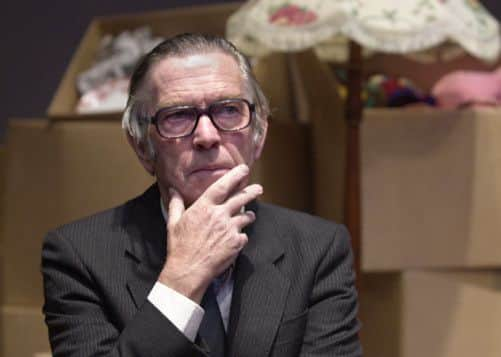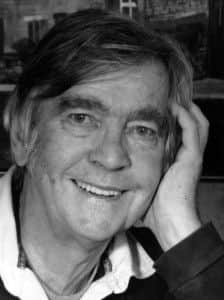Video: Bradford marks 50 years of Billy Liar


IT WILL be a nervous Tom Courtenay who sits in Bradford’s Pictureville cinema this weekend to watch A Day in the Life of Ivan Denisovich, his bleak 1970 film version of dissident Alexander Solzhenitsyn’s harrowing account of life in a Soviet gulag.
Courtenay’s nerves will not be on account of the subject – Finnish director Caspar Wrede’s film is a wholly accurate depiction of the struggle for survival in a forced labour camp – but due to the brittle condition of the film.
Advertisement
Hide AdAdvertisement
Hide Ad“It was shown at a little festival in Dinard last autumn,” recalls Courtenay. “It was a not very good print. I don’t know how they found it. I said ‘It’s going to break down, this print’, and it did, but right before it really got going.”


Courtenay suspects that Bradford audiences will be treated to the self-same ragged print. He adds, “There’s only one. The company that made it disappeared and then it went to somebody else and they don’t know what to do with it. There’s a very poor DVD of it and they won’t release it. I thought they were waiting for Solzhenitsyn to die but he did and still nothing.”
Courtenay’s work on A Day in the Life of Ivan Denisovich represented the end of a remarkable decade that had begun with Wrede on 1962’s Private Potter, the story of a soldier who claims to have seen a vision of Jesus.
The Solzhenitsyn film was the type of project Courtenay was drawn to and it remains both his favourite film and his favourite of his own performances. Solzhenitsyn himself approved of the film and commented to Wrede, “You have been true to the truth.” However, he thought Courtenay was too young.
Advertisement
Hide AdAdvertisement
Hide Ad“I think I was,” concedes the 76-year-old. “I was about 32 but I looked younger. He should have been more gnarled but Caspar didn’t want a realistic thing; he wanted the film to be otherworldly, which it is.”


Courtenay’s association with Bradford stretches back to the “kitchen sink” explosion of the 1960s when filmmakers like Tony Richardson, John Schlesinger and John Osborne were re-forming Britain’s film output via their New Wave. Courtenay, along with Albert Finney, Laurence Harvey and Richard Harris, was at the heart of it.
He enjoyed an almost instantaneous leap to stardom but found the burden of immediate fame difficult to bear. On leaving drama school at RADA he went to the Old Vic and then replaced Albert Finney in the title role of Billy Liar at the Cambridge Theatre.
He was also courted by Wrede, Richardson and Osborne, then running Woodfall Films, who wanted him to play the lead in The Loneliness of the Long Distance Runner, a sly tale of a rebellious Borstal boy who bucks the system.
Advertisement
Hide AdAdvertisement
Hide Ad“There was all this talk about me being the next Albert Finney,” says Hull-born Courtenay of his Salford-born contemporary. “It was heady stuff. I hadn’t been out of drama school more than a couple of months when Tony Richardson asked if I’d heard of a book called The Loneliness of the Long Distance Runner and I hadn’t. He said ‘We’re going to do a film of it and you’ll be marvellous in it’.
“There was no question of turning it down – too exciting. It was my background, or something like it anyway. There was no hesitation at all. It was only a question of whether it would happen because it was sometime after that that the film was made. And he held to his word.”
Courtenay’s first two years as a professional actor were tremendously successful. From the Old Vic to Billy Liar. Then three films in a row: Private Potter, Long Distance Runner and finally Billy Liar, largely shot on location in Bradford and Leeds in 1962. Courtenay gave the lie to the cliché of overnight stardom; for him it really happened.
Yet within five years he was looking to new horizons – to Manchester’s Century Theatre and the embrace of the stage. In between there were more movies for directors like Joseph Losey (King & Country), Michael Anderson (Operation Crossbow), and David Lean (Doctor Zhivago, for which Courtenay received an Academy Award nomination as Best Supporting Actor).
Advertisement
Hide AdAdvertisement
Hide AdHe went to the Century – a precursor to the Royal Exchange Theatre – in 1968 to play Lord Fancourt Babberley in Charley’s Aunt with a young Helen Mirren.
Over the next eight years he was a frequent collaborator with Wrede, Braham Murray and Michael Elliott in Manchester. He acted in The Playboy of the Western World, Romeo and Juliet, She Stoops to Conquer, Peer Gynt and The Dresser. Thus he edged out of the movies’ limelight and nestled beneath the proscenium arch.
It all began with Wrede. I suggest to Courtenay that everyone needs a mentor and that Caspar Wrede was his.
“Well, he was a huge influence. He suggested that I first went to Manchester so that was all to do with him. It was just in my nature to want an authority. At school there was the English master. I wanted somebody that I could believe in. You learn over the years that you’ve got to do it for yourself. It takes a while, though. It took me a long while.
Advertisement
Hide AdAdvertisement
Hide Ad“He knew I was looking for somewhere to practice, just to learn the trade and that’s why I went up to do Charley’s Aunt. I thought I would have a longer career if I could act on the stage. And also I think you learn more in front of audiences when you’re younger. You learn the timing.”
I ask whether he would have preferred to earn his stripes on stage before entering films. His reply is unequivocal.
“Yes, absolutely. But I had no choice. It was just what happened. It was quite tough to have success that suddenly. The good thing is that my mother knew that I was on my way before she died [in 1962]. That was the best thing about it.”